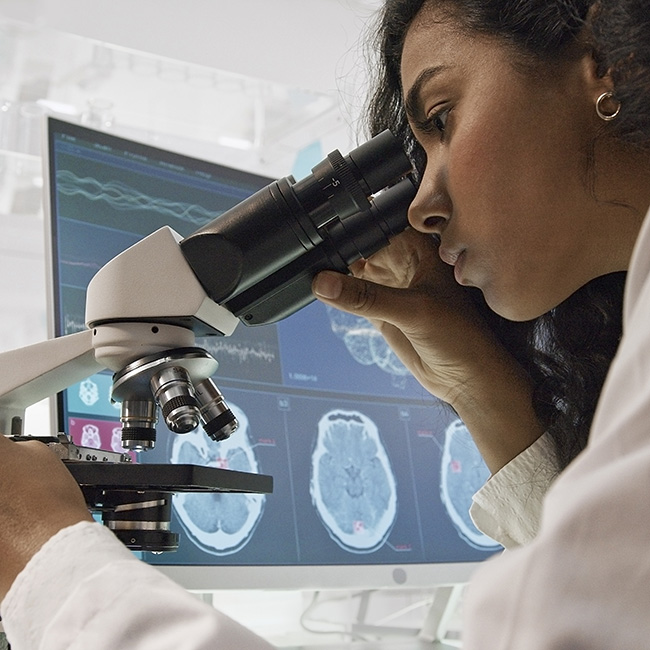Two highly experienced teams will work together to advance new drugs for the most common type of brain tumor
Today, the National Brain Tumor Society (NBTS) announced a $400,000 grant to Drs. Priscilla K. Brastianos, Director, Central Nervous System Metastasis Center, Mass General Cancer Center (MGH), and Associate Professor of Medicine at Harvard Medical School, and Rachael Vaubel, Neuropathologist and Assistant Professor of Laboratory Medicine and Pathology at the Mayo Clinic. Together with expert collaborators, these two principal investigators will develop much-needed preclinical models of meningioma brain tumors and then utilize these models to evaluate potential targeted therapies that could quickly be translated into an ongoing clinical trial.
“Meningiomas are the most common brain tumors,” said NBTS Chief Executive Officer, David Arons. “And while most of these tumors are non-malignant, a subset of patients are diagnosed with aggressive, malignant meningiomas. Unfortunately, for these patients, there are currently no effective treatment options if surgery and radiation fail to keep the tumor in check. This exciting project sets the stage for new, transformative treatments that could profoundly impact those living with meningioma.”
Recent discoveries have greatly improved the understanding of the molecular drivers of aggressive meningioma tumors, and for many of the implicated genetic alterations, target drugs are already in development or on the market and have shown success in other cancers. But the ability to preclinically test and translate these drugs for meningioma patients has been greatly hampered by a lack of well-validated preclinical mouse models of these tumors. Combined, the teams at Mayo Clinic and MGH have extensive experience successfully establishing mouse models of brain tumors, and their first aim for this project will be to develop serially-transplantable patient-derived meningioma xenograft lines.
“With high surgical volumes at both institutions and the joint expertise of our teams in both patient-derived models and meningioma biology, we expect to generate new models of different genetic subgroups, which will be shared with the scientific community to develop novel therapeutic avenues for meningiomas,” said Dr. Vaubel.
The second aim of the grant will be to evaluate the combination of targeted therapies across the preclinical models. Specifically, a drug called GSK2256098, which inhibits FAK, recently demonstrated encouraging activity in certain meningioma patients in a national clinical trial also being led by members of the Mayo and MGH teams and warrants further investigation. Additionally, preliminary data show that the drug may be effective for tumors with NF2 mutations, the most frequent genetic alterations in meningioma. The team will evaluate FAK inhibition in combination with other targeted therapies in their preclinical models.
Because members of the grant team are leading the first multicenter, national precision medicine trial in meningiomas (Alliance Trial A071401, sponsored by the Alliance for Clinical Trials in Oncology, a National Cancer Institute cooperative group), if the preclinical studies are successful additional drug combinations could quickly be evaluated in patients within this trial.
“Our combined teams have an extensive track record leading successful multidisciplinary research efforts from genetic discovery, through translational work, and into clinical trials for meningiomas and other CNS tumors,” added Dr. Brastianos. “We are currently leading the first national genomically guided trial in meningiomas. Thus, the overarching objective here is to establish a streamlined preclinical pipeline of patient-derived xenograft mouse models wherein novel targeted therapies are evaluated. Promising results can then be rapidly translated, enabling us to add therapeutic arms to this trial.”
Meningiomas are the most common intracranial tumors, accounting for nearly 40 percent of all primary brain and central nervous system (CNS) tumor diagnoses. Meningiomas are significantly more common in women than men, blacks than whites, and have an increasing incidence rate with age. Ten-year relative survival for non-malignant meningioma is approximately 84 percent, and 67.5 percent for malignant tumors.
Collaborators on the projects include Drs. Dan Cahill, Frederick Barker, and Hiro Wakimoto from MGH, and Drs. Evanthia Galanis, and Jann Sarkaria from the Mayo Clinic. Each institution will receive $200,000 over two years. Funding for the grant is the result of generous philanthropic support raised by NBTS donors, including support from Goldhirsh-Yellin Foundation and the Meningioma Research Fund in collaboration with the Brain Science Foundation.
About the National Brain Tumor Society
Building on over 30 years of experience, the National Brain Tumor Society (NBTS) unrelentingly invests in, mobilizes, and unites the brain tumor community to discover a cure, deliver effective treatments, and advocate for patients and caregivers. Our focus on defeating brain tumors and improving the quality of patients’ lives is powered by our partnerships across science, health care, policy, and business sectors. We fund treatments-focused research and convene those most critical to curing brain tumors– once and for all. Join us at BrainTumor.org.



